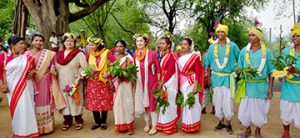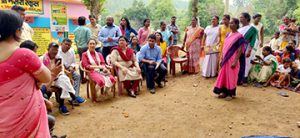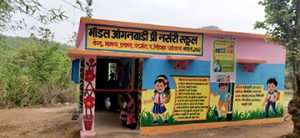The Porahat forest area in the Bandgaon block, district West Singhbhum, is highly remote and very hard to reach. Health service delivery has been a nightmare for the communities living in the area due to its difficult terrain, densely forested area, lack of communication and connectivity, distantly isolated settlements dominated by the Munda tribe until a few months ago. It has been observed that differential achievements between rural/urban areas, hard to reach and conflict-affected areas as compared to other areas and socioeconomic groups is still a matter of concern. Without a focused effort to eliminate these disparities, the burden of poor health on the vulnerable populations is expected to grow in size and intensity.
Although there are several localized attempts to reduce this gap, no significant changes have been observed and the demand for services as well as service delivery had become a challenge. Child and maternal mortality were on the rise and immunization as well as institutional delivery coverage were very low and many villages were not linked to community and facility-based care.
The intervention in the last one year led to many positive outcomes despite many challenges and bottlenecks:
- Regularizations of Gram Sabhas on the issues of government health services across 60 villages in Bandgaon and Manoharpur Blocks with increased participation of the communities, traditional leadership, government frontline staff.
- Over 70% increase in immunisation coverage in the area.
- 20% – 60% increase in institutional delivery in the area.
- Dysfunctional Health Sub-Centres have been fixed and all the desired health services are being restored in Hesadih Panchayats, Bandgaon Block.
- Restoration of all services at ICDS centres in both blocks have been done and an ICDS centre was upgraded to a model ICDS centre at Mamla Village, Bandgaon Block.
- Collectivisation and teamwork among the community, government front line staff and CSO staff for pushing the agenda for increased community access to health services was a successful effort.
Ms. Foroogh Foyouzat, Deputy representative, India Country Office, UNICEF India, along with UNICEF Jharkhand Team visited the area to understand the challenges and issues faced by the communities in accessing health services effectively. The work done by ASRA and PHIA foundation in community mobilisation, sensitization of the front-line staff, traditional leadership and Gram Sabha.
She said,“ I am amazed to see such a community gathering in a very remote forested village and participating in bettering their lives and their children. We should as Collectives do all possible ways and means to bring health services as much closer to the communities as possible and save lives of poor families in particular to Mother and Child at their very early ages to safeguard them from vulnerabilities and vagaries of poverty and marginalisation.”




Mr. Johnson Topno, State Manager, PHIA Foundation, spoke about the difficulty of the organisation’s journey in the rough terrain and hard to reach areas. Various issues included retention of field staff, making Gram Sabha regular and responsible to address issues of health and livelihoods, sensitization of front-line staff and convergence initiatives. The community has now gained momentum in addressing issues of health service delivery and support from health functionaries and the stakeholders should continue to foster more interventions over larger geographical areas in the region.
It was shared that,
- To work in these hard to reach areas and conflict-affected areas, a long-term commitment and support to address health-services delivery gaps with a blend to address livelihood needs of the communities by ensuring convergence with other line department is required.
- Stronger community engagement by building community capacities, strengthen gram sabha and its standing committees considering it falls under 5th Schedule of the Constitution of India to act as a WATCH to monitor and track the institutional functioning – ICDS, Schools, Mid-Day Meal, VHNSC, VHND and convergence initiative by having community ownership are also pressing requirements.
- Funds from District Mineral Fund Trust (DMFT) could be harnessed for setting up the infrastructure related projects
- Inshore ambulance facilities
- Transforming all the ICDS to a model ICDS centers.
- Upgrading all the health of center in D hard to reach areas
- Recruitment of additional frontline staff -nursing, frontline staff (Sahiya, Sevika and ANM).
- Setting up of special grievance Health Center at the block level
- Provisioning additional travelling support too hard to reach areas for frontline staff and volunteers
Testimonies:
Mr. Lebiya Bodra, ( Munda) – A traditional Leader of the village says, “ there has been lots of awareness among the communities on the roles and responsibilities of the Gram Sabha & front-line staff, functions of ICDS centre and changing attitude on seeking support for immunization, vaccination and regular health check-ups. We shall take further these learnings to other villages in their neighbourhood as well”.
Dr. Madhu Jonathan, Chief Field Office – UNICEF, Jharkhand said “Happy to see the changing health seeking behaviour among the communities and at the same time health becoming one of the important agendas of the Gram Sabha.”
Mr. Ejaz Anwar, District Social Welfare Officer, Govt. of Jharkhand was very overwhelmed seeing the work on Improving maternal and child health outcomes in hard to reach areas and with a commitment he said “ Taking the learning from this initiative District Administration would make District Mineral Fund Trust to undertake upgradation of more than 100 ICDS centres and 50 Health Sub Centre in the Hard to reach Areas.”













